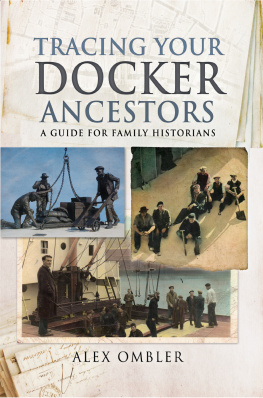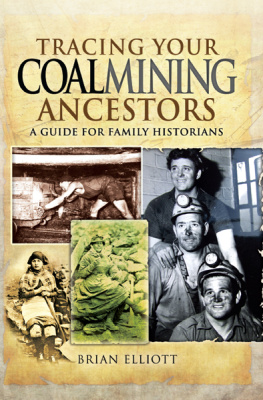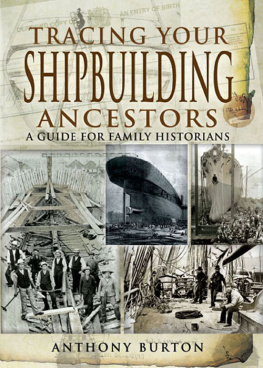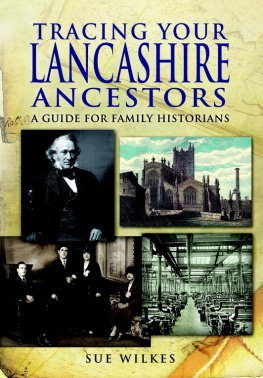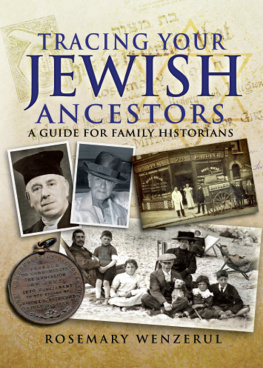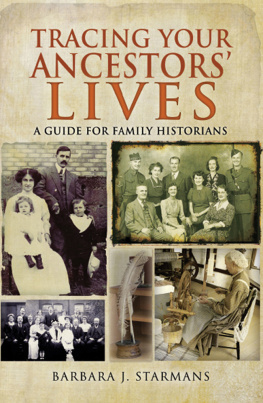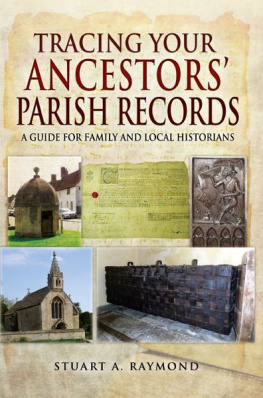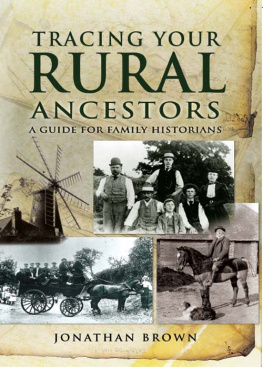Tracing Your Docker Ancestors

TRACING YOUR DOCKER ANCESTORS
FAMILY HISTORY FROM PEN & SWORD
Tracing Secret Service Ancestors
Tracing Your Air Force Ancestors
Tracing Your Ancestors
Tracing Your Ancestors from 1066 to 1837
Tracing Your Ancestors Through Death Records
Tracing Your Ancestors Through Family Photographs
Tracing Your Ancestors Using the Census
Tracing Your Ancestors Childhood
Tracing Your Ancestors Parish Records
Tracing Your Aristocratic Ancestors
Tracing Your Army Ancestors 2nd Edition
Tracing Your Birmingham Ancestors
Tracing Your Black Country Ancestors
Tracing Your British Indian Ancestors
Tracing Your Canal Ancestors
Tracing Your Channel Islands Ancestors
Tracing Your Coalmining Ancestors
Tracing Your Criminal Ancestors
Tracing Your East Anglian Ancestors
Tracing Your East End Ancestors
Tracing Your Edinburgh Ancestors
Tracing Your First World War Ancestors
Tracing Your Great War Ancestors: The Gallipoli Campaign
Tracing Your Great War Ancestors: The Somme
Tracing Your Great War Ancestors: Ypres
Tracing Your Huguenot Ancestors
Tracing Your Jewish Ancestors
Tracing Your Labour Movement Ancestors
Tracing Your Lancashire Ancestors
Tracing Your Leeds Ancestors
Tracing Your Legal Ancestors
Tracing Your Liverpool Ancestors
Tracing Your London Ancestors
Tracing Your Medical Ancestors
Tracing Your Merchant Navy Ancestors
Tracing Your Naval Ancestors
Tracing Your Northern Ancestors
Tracing Your Pauper Ancestors
Tracing Your Police Ancestors
Tracing Your Prisoner of War Ancestors: The First World War
Tracing Your Railway Ancestors
Tracing Your Royal Marine Ancestors
Tracing Your Rural Ancestors
Tracing Your Scottish Ancestors
Tracing Your Second World War Ancestors
Tracing Your Servant Ancestors
Tracing Your Service Women Ancestors
Tracing Your Shipbuilding Ancestors
Tracing Your Tank Ancestors
Tracing Your Textile Ancestors
Tracing Your Trade and Craftsmen Ancestors
Tracing Your Welsh Ancestors
Tracing Your West Country Ancestors
Tracing Your Yorkshire Ancestors
TRACING YOUR DOCKER ANCESTORS
A Guide for Family Historians
Alex Ombler
First published in Great Britain in 2019
PEN & SWORD FAMILY HISTORY
an imprint of
Pen & Sword Books Ltd
Yorkshire Philaddelphia
Copyright Alex Ombler, 2019
ISBN 978 1 52674 404 3
eISBN 978 1 52674 405 0
Mobi ISBN 978 1 52674 406 7
The right of Alex Ombler to be identified as Author of the Work has been asserted by him in accordance with the Copyright, Designs and Patents Act 1988.
A CIP catalogue record for this book is available from the British Library.
All rights reserved. No part of this book may be reproduced or transmitted in any form or by any means, electronic or mechanical including photocopying, recording or by any information storage and retrieval system, without permission from the Publisher in writing.
Pen & Sword Books Ltd incorporates the imprints of Pen & Sword Airworld, Archaeology, Atlas, Aviation, Battleground, Discovery, Family History, Fiction, History, Maritime, Military, Military Classics, Politics, Select, Social History, True Crime, Frontline Books, Leo Cooper, Remember When, Seaforth Publishing, The Praetorian Press, Wharncliffe Local History, Wharncliffe Transport, Wharncliffe True Crime and White Owl.
For a complete list of Pen & Sword titles please contact
PEN & SWORD BOOKS LTD
47 Church Street, Barnsley, South Yorkshire, S70 2AS, England
E-mail:
Website: www.pen-and-sword.co.uk
or
PEN & SWORD BOOKS LTD
1950 Lawrence Rd., Havertown, PA 19083, USA
E-mail:
Website: www.penandswordbooks.com
INTRODUCTION
The British dock labour force was one of the largest and most important working groups in the country during the nineteenth and twentieth centuries. In 1921 some 125,000 dockers were employed across the countrys numerous ports, where millions of tons of seaborne cargo were handled annually. Amongst the imported goods unloaded by the dockers were foodstuffs which fed the nation, whilst raw materials such as timber, cotton, wool and metal ores arrived on the docks for processing across various industries. The export cargos loaded by dock workers, mainly manufactures and coal, were sold overseas and brought wealth to the nation. In addition, the dockers contribution to trade unionism was a vital step in the creation of the modern labour movement. Most notably the Great Dock Strike of 1889 galvanized other unskilled workers into collective action to gain improvements in pay and working conditions.
Despite being an essential cog in Britains port transport system, the dockers remain a largely unknown group. Entry into dock work, which largely took place behind the dock wall, was virtually impossible for outsiders. Consequently the dockers working practices, organization and culture were shrouded in mystery. This was often exploited by the media who regularly scapegoated the dockers and their industrial action for the economic ills of the day. The cargo-handling revolution in the 1960s caused many of the old docks, quays and sheds where the dockers worked to fall into disuse and dereliction. During the 1980s, many of these areas were redeveloped as luxury waterfront accommodation, retail and business centres, and leisure sites.
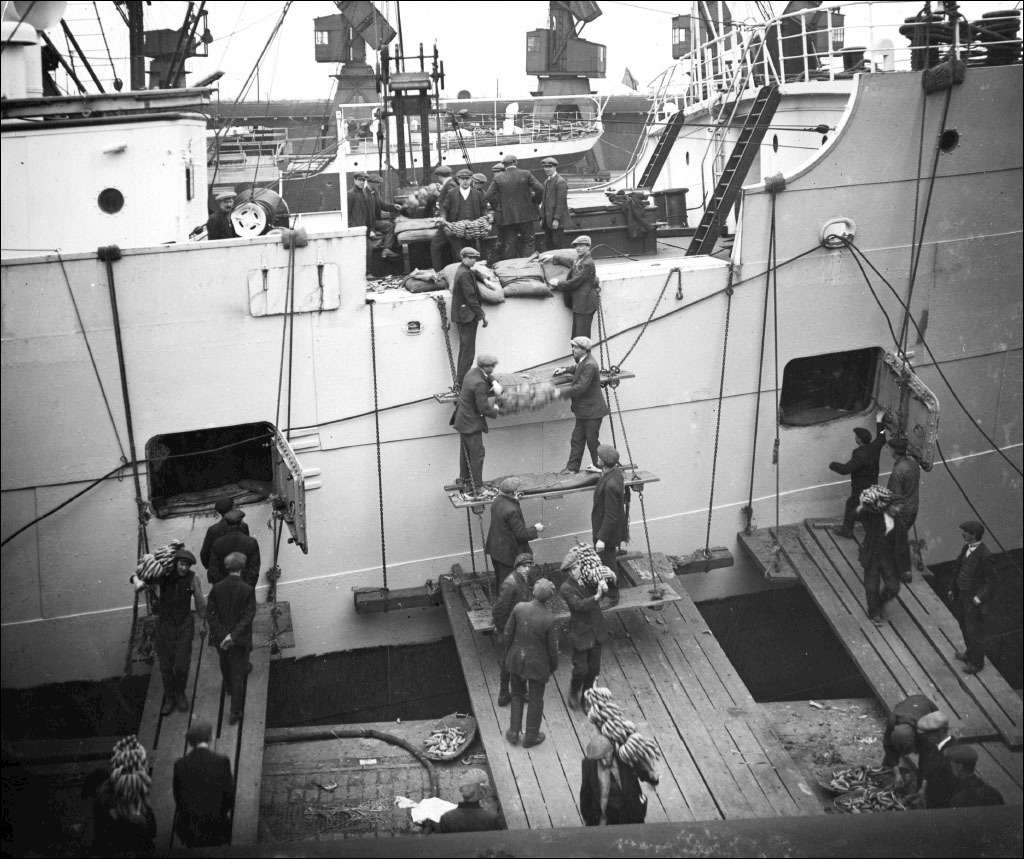
Dockers at work in gangs unloading a cargo of bananas c. 1937. Image courtesy of Maritime Museum: Hull Museums.
Today there is little trace in the landscape that the dockers ever existed.
The aim of this book is twofold. First, it provides a history of the dockers from their origins in the mid-nineteenth century to their decline and eventual disappearance by the late 1980s. This history provides a background to the personal experiences of those who worked on the docks. It must be noted that, although Britains dockers as a whole were similar in character, the dock labour forces of each port had their own localized traditions, practices and terminology. As there is not space to deal with all of the nuances of dockland, the historical information in this book has been written with a general pattern of experience in mind. Second, the book identifies the types of records and artefacts that can give family historians an insight into the lives of the dockers. Furthermore, it provides a practical guide on where such sources can be found and how they can be accessed.
The first chapter is intended as a starting point and offers a guide on widely used family history sources. This will help establish a firm foundation of basic information including names, dates and places, upon which more specialized research can be built. The following Chapters 2 to 8 are thematic in nature and explore different aspects of dock life between c. 1840 and the 1960s. This includes the origins of the work force, the development of trade unionism on the docks, the daily working lives of the dockers, the tools they used, their culture and community outside of work, the role they played in both World Wars, and the Governments innovative attempts to improve their organization via the National Dock Labour Scheme. The final chapter deals with the technological developments in cargo-handling that emerged after the Second World War and the large-scale Government reforms in the port transport industry in response to such change. It also explores the how these reforms caused the decline and disappearance of the dockers culture and traditions, which had endured for generations.

